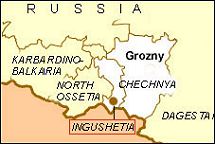 |  |
|
RussiaThe Chechnya Dilemma
The only autonomous jurisdictions that refused to sign the 1992 Federation Treaty were Chechnya and Tatarstan, both of which are rich in oil. In the spring of 1994, President Yeltsin signed a special political accord with the president of Tatarstan granting many of the Tatar demands for greater autonomy. Yeltsin declined to carry out serious negotiations with Chechnya, however, allowing the situation to deteriorate into full-scale war at the end of 1994 (see Chechnya, ch. 9). In the first half of 1996, Chechnya continued to pose the biggest obstacle to the quelling of separatism among the components of the Russian Federation. Chechnya long has had a reputation in Russia as a center of organized crime and corrupt business practices; the Chechen mafiya has a particularly fierce reputation. The proportion of Chechens and other Caucasians in Russia's emerging market economy is much higher than the representation of these nationalities in the population as a whole. In its propaganda campaign to justify military action against Chechnya, the Russian government played upon the stereotypes of the criminal and the dishonest businessman. It also illustrated the brutal practices of the Chechen rebels by broadcasting photos of the severed heads of victims along the roads in the breakaway republic. Meanwhile, Russians adopted the habit of including all individuals of non-Slavic appearance under the heading "Chechen," widening the existing strain of racism in Russia's society. The first Russian invasion of Chechnya occurred during the time of Peter the Great, in the early eighteenth century. After a long series of fierce battles and bloody massacres, Chechnya was incorporated into Russia in the 1870s. In 1936 Stalin created the Chechen-Ingush Autonomous Republic. In 1943, when Nazi forces reached the gates of the Chechen capital, Groznyy, Chechen separatists staged a rebellion against Russian rule. In response, the next year Stalin deported more than 1 million Chechens, Ingush, and other North Caucasian peoples to Siberia and Central Asia on the pretext that they had collaborated with the Nazis. The remaining Muslim people of the Chechnya region were resettled among neighboring Christian communities. Stalin's genocidal policy virtually erased Chechnya from the map, but Soviet first secretary Nikita S. Khrushchev permitted the Chechen and Ingush peoples to return to their homeland and restored their republic in 1957. The series of events since the Soviet Union's collapse flowed naturally from the Chechens' long-standing hatred of the Russians. In September 1991, the government of the Chechen-Ingush Autonomous Republic resigned under pressure from the proindependence Congress of the Chechen People, whose leader was former Soviet air force general Dzhokar Dudayev. The following month, Dudayev won overwhelming popular support to oust the interim, central government-supported administration and make himself president. Dudayev then issued a unilateral declaration of independence. In November 1991, President Yeltsin dispatched troops to Groznyy, but they were withdrawn when Dudayev's forces prevented them from leaving the airport. The Chechen-Ingush Autonomous Republic split in two in June 1992. After Chechnya had announced its initial declaration of sovereignty in 1991, Ingushetia joined the Russian Federation; Chechnya declared full independence in 1993. In August 1994, when an opposition faction launched an armed campaign to topple Dudayev's government, Moscow supplied the rebel forces with military equipment, and Russian aircraft began to bomb Groznyy. In December, five days after Dudayev and Minister of Defense Pavel Grachev of Russia had agreed to avoid the further use of force, Russian troops invaded Chechnya. The Russian government's expectations of a quick surgical strike followed by Chechen capitulation were misguided. The protracted war in Chechnya, which generated many reports of violence against civilians, ignited fear and contempt toward Russia among many other ethnic groups in the federation. Experts believe that the inability of Russian forces to subdue the Chechen "bandits" also might encourage other ethnic groups to defy the central government by proclaiming and defending their independence. As the war was reported to the Russian public on television and in newspaper accounts, the rising protests from Russia's independent news media and various political and other interest groups soon came to threaten Russia's democratic experiment. Chechnya was one of the heaviest burdens Yeltsin carried during the 1996 presidential election campaign. In January 1996, the destruction of the Dagestani border village of Pervomayskoye by Russian forces in reaction to Chechen hostage taking brought strong criticism from the hitherto loyal Republic of Dagestan and escalated domestic dissatisfaction. Chechnya's declaration that it was waging a jihad (holy war) against Russia also raised the specter that Muslim "volunteers" from other regions and even outside Russia would enter the fray. However, Russia feared that a move to end the war short of victory would create a cascade of secession attempts by other ethnic minorities and present a new target to extreme nationalist Russian factions. Some fighting occurred in Ingushetia in 1995, mostly when Russian commanders sent troops over the border in pursuit of Chechen rebels. Although all sides generally observed the distinction between the two peoples that formerly shared the autonomous republic, as many as 200,000 refugees from Chechnya and neighboring North Ossetia strained Ingushetia's already weak economy. On several occasions, Ingush president Ruslan Aushev protested incursions by Russian soldiers, even threatening to sue the Russian Ministry of Defense for damages inflicted. Meanwhile, the war in Chechnya spawned a new form of separatist activity in the Russian Federation. Resistance to the conscription of men from minority ethnic groups to fight in Chechnya was widespread among other republics, many of which passed laws and decrees on the subject. For example, the government of Chuvashia passed a decree providing legal protection to soldiers from the republic who refused to participate in the Chechnya war and imposing limits on the use of the Russian army in ethnic or regional conflicts within Russia. Some regional and local legislative bodies called for a prohibition on the use of draftees in quelling internal uprisings; others demanded a total ban on the use of the armed forces in domestic conflicts. |
